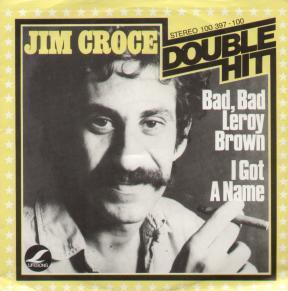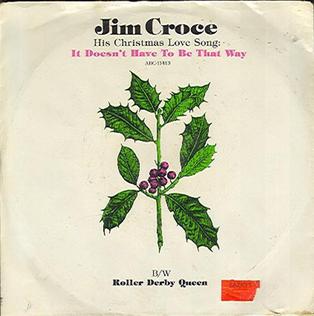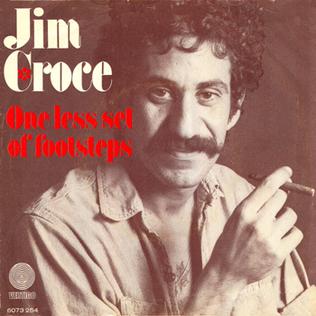 W
WLife and Times is the fourth studio album by American singer-songwriter Jim Croce, released in 1973. The album contains the No. 1 Billboard chart hit "Bad, Bad Leroy Brown". Croce was nominated for two 1973 Grammy awards in the "Pop Male Vocalist" and "Record of the Year" categories for the song "Bad, Bad Leroy Brown".
 W
W"Bad, Bad Leroy Brown" is a song written by American folk rock singer Jim Croce. Released as part of his 1973 album Life and Times, the song was a Number One pop hit for him, spending two weeks at the top of the Billboard Hot 100 in July 1973. Billboard ranked it as the No. 2 song for 1973.
 W
W"Chain Gang" is a song by the American singer-songwriter Sam Cooke, released on July 26, 1960.
 W
W"I Got a Name" is a 1973 single recorded by Jim Croce with lyrics by Norman Gimbel and music by Charles Fox. It was the first single from his album of the same title and also Croce's first posthumous single, released the day after his death in a plane crash on September 20. The song reached a peak of #10 on the Billboard Hot 100 after spending 17 weeks on the chart. It also hit #3 on the Cash Box Top 100.
 W
W"I'll Have to Say I Love You in a Song" is the title of a posthumously released single by the American singer-songwriter Jim Croce. The song was written by Croce and was originally released on his album I Got a Name.
 W
W"It Doesn't Have to Be That Way" is a song written and recorded by Jim Croce for his 1973 album Life and Times. Originally released early that year as the B-side of the "One Less Set of Footsteps" single, it was reissued that December as the third and final single from the album as well as Croce's second posthumously-released single. It reached a peak of #64 on the Billboard Hot 100, spending five weeks on the chart.
 W
W"Mama Tried" is a song written and recorded by American country music artist Merle Haggard and The Strangers. It was released in July 1968 as the first single and title track from the album Mama Tried. The song became one of the cornerstone songs of his career. It won the Grammy Hall of Fame Award in 1999, and was selected for preservation in the National Recording Registry due to its "cultural, historic, or artistic significance" on March 23, 2016, just 14 days before Haggard's death.
 W
WYou Don't Mess Around with Jim is the third studio album by American singer-songwriter Jim Croce, released in April 1972.
 W
W"One Less Set of Footsteps" is a song written and performed by Jim Croce. It was released in 1973 as the first single from his album Life and Times. It reached a peak of #37 on the Billboard Hot 100, spending ten weeks on the chart.
 W
W"Operator " is a 1972 song written by Jim Croce. Croce's record was released on August 23, 1972. It was the second single released from Croce's album You Don't Mess Around with Jim. It reached a peak of #17 on the Billboard Hot 100 in December 1972, spending twelve weeks on the chart.
 W
W"Six Days on the Road" is an American song written by Earl Green and Muscle Shoals Sound Studio songwriter Carl Montgomery, made famous by country music singer Dave Dudley. The song was initially recorded by Paul Davis and released in 1961 on the Bulletin label. In 1963, the song became a major hit when released by Dudley, peaking at #2 on the Billboard Hot Country Songs chart and cracking the Top 40 (#32) on the Hot 100, leading to it being hailed as the definitive celebration of the American truck driver.
 W
W"Time in a Bottle" is a hit single by singer-songwriter Jim Croce. Croce wrote the lyrics after his wife Ingrid told him she was pregnant, in December 1970. It appeared on his 1972 ABC debut album You Don't Mess Around with Jim and was featured in the 1973 ABC made-for-television movie She Lives!. ABC originally did not intend to release the song as a single; but when Croce was killed in a plane crash in September 1973, its lyrics, dealing with mortality and the wish to have more time, had additional resonance. The song subsequently received a large amount of airplay as an album track and demand for a single release built. When it was eventually issued as a 7", it became his second and final No. 1 hit. It was also the third posthumous Billboard number-one hit after "Sittin' on the Dock of the Bay" by Otis Redding and "Me and Bobby McGee" by Janis Joplin. After the single had finished its two-week run at the top in early January 1974, the album You Don't Mess Around with Jim became No. 1 for five weeks. In 1977, "Time in a Bottle" was used as the title for a compilation album of Croce's love songs.
 W
WYou Don't Mess Around with Jim is the third studio album by American singer-songwriter Jim Croce, released in April 1972.
 W
W"Workin' at the Car Wash Blues" is a 1974 single written and recorded by Jim Croce. It was the third single released from his album I Got a Name. It reached a peak of #32 in July 1974, on the Billboard Hot 100. It is Croce's last Top 40 hit to date. It was also the fourth single released, including Christmas-themed release "It Doesn't Have To Be That Way", after Jim Croce's passing in September 1973.
 W
W"You Don't Mess Around with Jim" is a 1972 single by Jim Croce from his album of the same name. The song was also Croce's debut single when it was released in June 1972 on ABC Records as ABC-11328. The song first aired on KHJ 930 AM in Los Angeles when ABC Records promotion man Marty Kupps took the single to the radio station, where it appeared on the KHJ "30" chart at number 27 during the week of June 6. After spending 11 weeks on the Billboard Hot 100 chart, the song peaked at No. 8 on the week ending September 9. Croce performed the song on American Bandstand on August 12, 1972. Billboard ranked it as the No. 68 song for 1972.